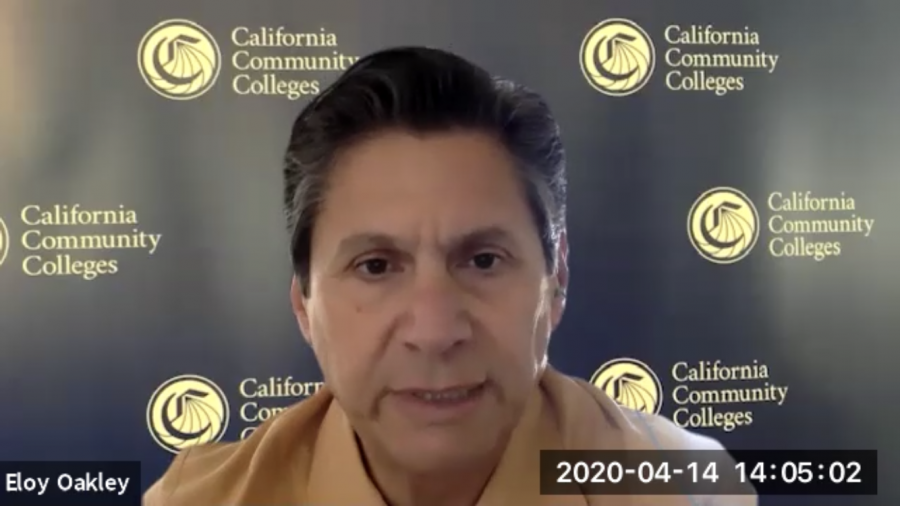CCC Chancellor aims to make grading policies more “flexible” during pandemic
CCC Chancellor Eloy Ortiz Oakley and Vice-Chancellor Marty J. Alvarado held a press conference for student media on April 14
Pictured here is a screenshot from a virtual press conference hosted by CCC Chancellor Eloy Ortiz Oakley as he addresses student media in on April 14, 2020.
California Community Colleges (CCC) Chancellor Eloy Ortiz Oakley and Vice-Chancellor Marty J. Alvarado hosted a ConferZoom press conference with student media on April 14, addressing many questions regarding the current educational climate as a result of the COVID-19 pandemic.
Oakley started the news conference by highlighting numerous executive orders issued by the CCC chancellor’s office in response to the transition to exclusively online education. According to Oakley, the idea behind these executive orders is to increase the flexibility of grading and withdrawal policies to help keep students enrolled in their courses.
“First, we issued an executive order, temporarily suspending student withdrawal regulations to address the continuity of education in our colleges during the COVID-19 declared a state of emergency,” Oakley said. “This was followed by the temporary suspension of various specified grade-related regulations to address, again, continuity of instruction and make our grading policy more flexible for our students in this time of crisis.”
The Coronavirus Aid, Relief and Economic Security (CARES) Act, which was signed into law by President Donald Trump on March 27, was also a major focus point of the conference. Along with just about every sector in the economy, plans to assist community colleges and higher education are addressed in the CARES Act.
“Currently, $300 million in aid to students with the greatest need will be arriving soon, so that they may continue their educational goals,” Oakley said. “The CARES Act, which is what the recently enacted law is called, provides colleges flexibility on how to award this emergency aid to students, which is what the California Community Colleges sought in this legislation.”
Before opening up to questions, Oakley strongly emphasized the importance of student participation in the 2020 United States Census.
“We’re collaborating with California Complete Count, Census 2020 office, to encourage every student to be counted,” Oakley said. “This is incredibly important because the resources that we need and the representation you deserve as students will be impacted by the Census.”
While Oakley was able to outline plans to help students during this crisis, he was unable to provide a clear timeline for a return to campus.
“Your guess is as good as mine,” Oakley said.
However, If students do return to their campuses in the fall, the chancellor suggests it would most likely be a limited return and acknowledged that faculty and staff should be prepared to continue instruction under some sort of social distancing guidelines.
“What we [told] the colleges is to be prepared to educate under some type of social distancing protocol,” Oakley said. “So, what that means is that there may be partially open in terms of physical locations, but we will try to maintain some type of social distancing protocol, have hybrid courses [and] a lot more online courses, so we can maintain distance and maintain public health.”








